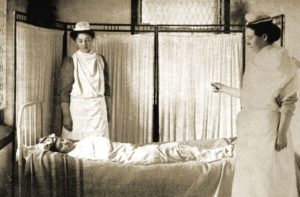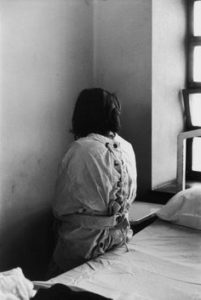
Wet Sheet Pack, 1902
Alienists considered light labor a welcome change of pace for patients and a great boon to their recovery (see last post) during the Civil War era. However, they also realized that every patient needed an individual plan that might include other therapeutics than labor, or no labor at all. Most specialists hoped that a calm, supportive environment would bring a patient back to health, but did recognize that sometimes more aggressive measures were needed.
If a patient showed signs of violence, there were several courses open to attendants. Restraint might be necessary, but what kind? “The worst form is where patients are held by the attendants,” said Dr. J. Paragot in his article, “General Mental Therapeutics.”

Restraints Could Be Horrifying For Patients
The next worst form of restraint was a cell, because attendants had to use force to place a patient in one, and then left him/her there in a state of frustration. In Dr. Paragot’s opinion, the best form of restraint was a leather strap around the wrists. “. . . the patient may enjoy the liberty of walking in the fields. . . . the patient may be left alone, no offered active violence overpowers him, it is but a passive resistance which annihilates his efforts.”
Moral restraint, imposed through “love, kindness, and reward” could also motivate patients to change their behavior. Hydrotherapy of various sorts–including swimming in tepid pools–could be beneficial, especially if a patient had the will to change but not the ability. Air baths (rambling about in the open air) could take the place of hydrotherapy for “the higher classes” in order to avoid any type of violence to the patient. Finally, a nutritious diet often helped patients enormously, particularly when they had physical problems as well as mental issues.

Elixer of Opium Promoted Restful Sleep and Composure and Relieved Nervous Excitement
Tonics and stimulants had their place for patients needing that kind of help, but Paragot generally urged the mildest means possible when doing anything more than counseling a patient. He recognized that hydrotherapy and various types of restraint options were often accompanied with violence toward a patient, which he found particularly negative in terms of a therapeutic outcome. If his enlightened views had prevailed, asylums might not have earned the disdain and dismay that haunt them to this day.